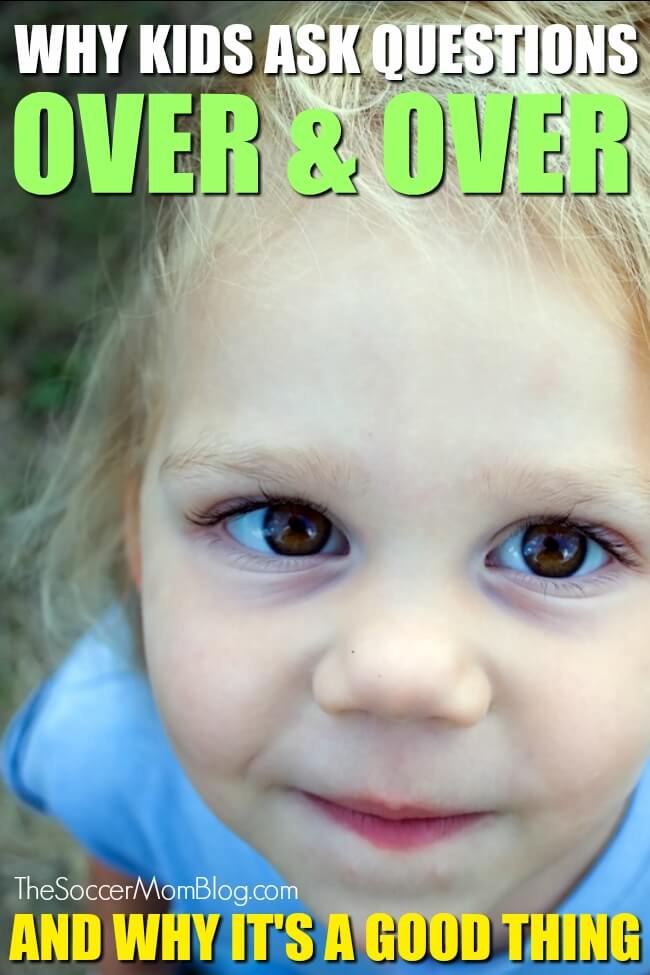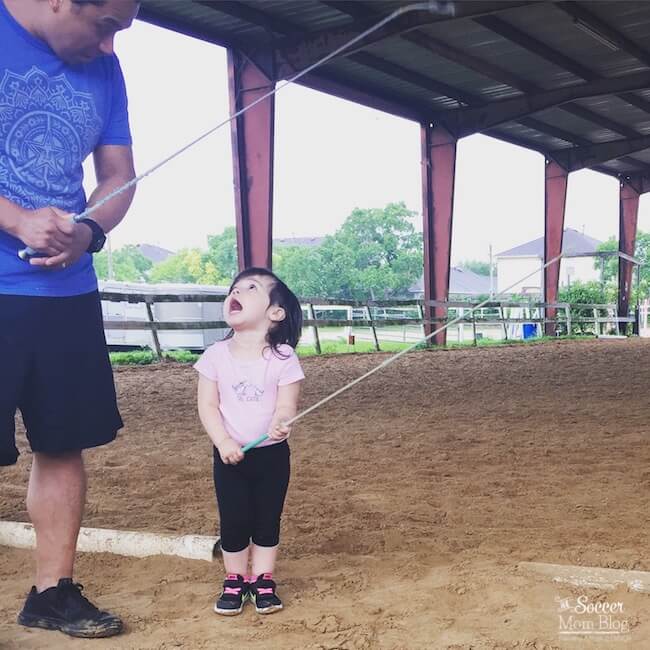Fact of life: kids repeat themselves and ask the same questions over and over. Here’s why that’s actually a GOOD thing for brain development.
“Da-da did you see that?”
“Da-da did you see that?”
“Da-da did you see that?”
My husband didn’t hear our two-year-old daughter over the sizzling of the dish he was sautéing on the stove. So she kept trying.
Instead of attracting his attention for her, I let things play out on their own. And a curious thing happened.
“Da-da did you see that?”
Our two year old daughter repeated herself in exactly the same cadence and tone each time. She never raised her voice, never became impatient or frustrated.
She simply repeated herself until she was heard.
And she was heard.
“No, what is it?” my husband turned down the stove and turned his attention to our daughter. Now that she knew she had her daddy’s full attention, our daughter excitedly told him the rest of the story.
Why Kids Repeat Themselves Over and Over
It’s a common complaint among parents: kids often ask the same questions over and over.
Whether it’s an actual question, or the dreaded “why? why? why?” — kids are notorious for repeating themselves.
It’s easy to get frustrated hearing the same thing over and over, or repeating your answers. Sometimes it feels like your child is trying to be annoying.
I promise you that your toddler or preschooler is likely not trying to get on your nerves. There are actually a few very good reasons that kids repeat themselves so often.
1. Practice Makes Perfect
Toddlers and preschoolers like to hear themselves talk. (To be honest, I think most people, regardless of age, like to hear themselves talk!)
Humans learn through repetition. Whether it’s how to solve a math equation or a tumbling skill in gymnastics class, practice makes perfect.
Speaking is no different!
When kids repeat themselves or ask the same question repeatedly, one of the main reasons is that they’re practicing speaking. Toddlers and preschoolers may repeat words and phrases to try them out and commit them to memory.
Study after study shows that speaking to babies and toddlers like adults (i.e. having real conversation with them) helps them learn to talk faster and have a larger vocabulary.
Experts also agree that repetitive speech is usually a normal behavior and not cause for concern.
The next time your toddler or preschooler repeats the same thing over and over, engage with them. Remember, the more you talk to them, the more they learn!
Related: Reading Aloud to Babies Teaches them 1.4 MILLION Words by Age 5
2. They Want to Make Sure You’re Paying Attention
Kids want to make sure that you’re paying attention to them. If you answer their question with a half-hearted “mmm-hmm,” that really isn’t a satisfying answer because it seems like you’re not listening.
Think about it — if you asked your spouse a question and they gave you a one-word answer, you probably wouldn’t be too happy about it either.
If your child thinks you’re not listening, they might ask the same question over and over to make sure that you heard. That’s what happened with my daughter in the story at the beginning of the post.
When your child asks you a question, be sure to make eye contact and answer directly and thoroughly the first time. Make it clear that you hear them and are giving them your full attention.
If your child knows you’re paying attention, they might not repeat themselves as often.
And if they do ask again…and again…and again, just know that it means they love you and they want to know that they are important to you too.
3. Their Brain is Working Overtime
Have you ever been talking and lost your train of thought? It happens all the time to me!
I’ll start telling a story, get excited, talk super fast, go off on a tangent…and then forget what I was trying to say in the first place.
This happens to kids too!
When I watch my four-year-old in action, sometimes her brain is going so fast that her words can’t seem to keep up.
She’ll often ask a question, then repeat it a few times while her brain processes her next thought. The repetition appears to jog her memory about what she wanted to say in the first place.
If your child repeats themselves, they may be trying to remember something they wanted to tell you. Be patient while they search for the right words, or you can try to help them figure it out by asking questions yourself.
4. They’re Trying to Make Sense of the World
The world is a confusing place, especially when you’ve only been living in it for a couple years!
When things happen that kids don’t understand, they may ask a lot of questions. They may ask the same question many times. They may ask the same question many times, but rephrased a bit each time.
Consistency in your answers is reassuring to kids.
What We Can ALL Learn About Effective Communication from Toddlers
Watching my 2-year-old daughter patiently repeat herself and wait for her father to hear her was an important reminder that patience is the key to effective communication.
We live in a busy world where we have grown accustomed to instant gratification. We can pick up the phone and not only talk to, but see someone who lives miles away…immediately. A quick google search can answer just about any burning question in seconds.
We don’t want to wait to be acknowledged — it is part of the entitlement mentality that is prevalent in our society. I myself am guilty of it too sometimes!
But communication isn’t just about us — communication is a two-way interaction with another person.
Just because our children communicate differently, or repeat themselves, don’t mean that their thoughts and questions aren’t important.
In fact, if our kids are repeating themselves because we’re not listening, they’re actually a step ahead of us in the patience department!
As parents, we’re used to “knowing what’s best” from our decades of life experience. We don’t usually expect our children to teach us something new!
But if you think about it, our kids are always watching and learning from the world around them. Because they have such a thirst to learn and grow, they may pick up on things that we miss.
Sometimes it pays to slow down, and take notes from the “professional learners” in our lives.
More of our most popular parenting posts:
How to Stop Temper Tantrums in Seconds
Experts Say: Raising Strong Daughters Requires a Strong Mother
- Paper Chain Octopus Craft - April 24, 2024
- Amish Sugar Cookies - April 19, 2024
- Marshmallow Playdough - April 18, 2024







Alina says
That’s so true, my child keeps repeating same thing 4-5 times on same voice and I’m getting impatient if he didn’t listen to me from the first…
Hashtag-> feeling guilty!
Jennifer Sackett says
Thank you for this mama!!
Stacey aka the Soccer Mom says
You’re welcome 🙂
Iris Rivera says
Your article is really interesting. May please ask if this is from personal experience or from peer review sources? I’d like to research further into this. Thank you.
Stacey aka the Soccer Mom says
Hi Iris — a little bit of both. Much of what I write is based on my own experience and things I’ve read over the years. I note and link to any specific sources that are referenced in my posts.
Edith says
This was so helpful thanks so much
Emily says
What an interesting article! Similarly, my (4 year old) son also loves reading the same books over and over, which I think is also helpful for their cognitive development. The more he reads the same book over and over, the more he is able to tell me about it. Sometimes he even “reads” them to me now lol.